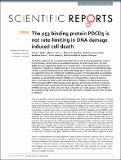| dc.contributor.author | Tanzer, Maria C. | |
| dc.contributor.author | Haschka, Manuel D. | |
| dc.contributor.author | Krumschnabel, Gerhard | |
| dc.contributor.author | Sohm, Benedicte | |
| dc.contributor.author | Goetsch, Katrin | |
| dc.contributor.author | Kofler, Reinhard | |
| dc.contributor.author | Villunger, Andreas | |
| dc.contributor.author | Bock, Florian | |
| dc.date.accessioned | 2015-09-10T15:33:22Z | |
| dc.date.available | 2015-09-10T15:33:22Z | |
| dc.date.issued | 2015-06 | |
| dc.date.submitted | 2014-10 | |
| dc.identifier.issn | 2045-2322 | |
| dc.identifier.uri | http://hdl.handle.net/1721.1/98435 | |
| dc.description.abstract | The tumour suppressor p53 is an important mediator of cell cycle arrest and apoptosis in response to DNA damage, acting mainly by transcriptional regulation of specific target genes. The exact details how p53 modulates this decision on a molecular basis is still incompletely understood. One mechanism of regulation is acetylation of p53 on lysine K120 by the histone-acetyltransferase Tip60, resulting in preferential transcription of proapoptotic target genes. PDCD5, a protein with reported pro-apoptotic function, has recently been identified as regulator of Tip60-dependent p53-acetylation. In an effort to clarify the role of PDCD5 upon DNA damage, we generated cell lines in which PDCD5 expression was conditionally ablated by shRNAs and investigated their response to genotoxic stress. Surprisingly, we failed to note a rate-limiting role of PDCD5 in the DNA damage response. PDCD5 was dispensable for DNA damage induced apoptosis and cell cycle arrest and we observed no significant changes in p53 target gene transcription. While we were able to confirm interaction of PDCD5 with p53, we failed to do so for Tip60. Altogether, our results suggest a role of PDCD5 in the regulation of p53 function but unrelated to cell cycle arrest or apoptosis, at least in the cell types investigated. | en_US |
| dc.description.sponsorship | FP06 RTN ‘ApopTrain’ | en_US |
| dc.description.sponsorship | Tyrolean Science Fund | en_US |
| dc.description.sponsorship | Krebshilfe-Tyrol | en_US |
| dc.language.iso | en_US | |
| dc.publisher | Nature Publishing Group | en_US |
| dc.relation.isversionof | http://dx.doi.org/10.1038/srep11268 | en_US |
| dc.rights | Creative Commons Attribution | en_US |
| dc.rights.uri | http://creativecommons.org/licenses/by/4.0/ | en_US |
| dc.source | Nature Publishing Group | en_US |
| dc.title | The p53 binding protein PDCD5 is not rate-limiting in DNA damage induced cell death | en_US |
| dc.type | Article | en_US |
| dc.identifier.citation | Bock, Florian J., Maria C. Tanzer, Manuel D. Haschka, Gerhard Krumschnabel, Benedicte Sohm, Katrin Goetsch, Reinhard Kofler, and Andreas Villunger. “The p53 Binding Protein PDCD5 Is Not Rate-Limiting in DNA Damage Induced Cell Death.” Scientific Reports 5 (June 11, 2015): 11268. | en_US |
| dc.contributor.department | Koch Institute for Integrative Cancer Research at MIT | en_US |
| dc.contributor.mitauthor | Bock, Florian J. | en_US |
| dc.relation.journal | Scientific Reports | en_US |
| dc.eprint.version | Final published version | en_US |
| dc.type.uri | http://purl.org/eprint/type/JournalArticle | en_US |
| eprint.status | http://purl.org/eprint/status/PeerReviewed | en_US |
| dspace.orderedauthors | Bock, Florian J.; Tanzer, Maria C.; Haschka, Manuel D.; Krumschnabel, Gerhard; Sohm, Benedicte; Goetsch, Katrin; Kofler, Reinhard; Villunger, Andreas | en_US |
| mit.license | PUBLISHER_CC | en_US |
| mit.metadata.status | Complete | |
